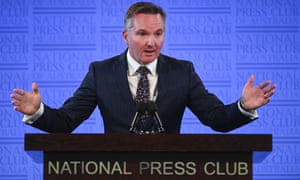Extract from The Guardian
Chris Bowen
Labor says plan to end cash rebates for excess franking credits, and
tax family trusts and high-income earners will apply from July
Labor’s proposal to raise billions by ending cash rebates for excess
franking credits, and tax family trusts and high-income earners, will
apply from 1 July this year if it wins the May election.
The shadow treasurer, Chris Bowen, confirmed the start date for the tax measures at the National Press Club on Wednesday in a speech promising Labor would deliver bigger and more believable budget surpluses than the Coalition.
Bowen also angrily defended the accuracy of Parliamentary Budget Office costings of the opposition’s signature negative gearing reform and promised it had learned its lessons from the Rudd-Gillard era and would not replace Bill Shorten if he was elected prime minister.
Labor is preparing for the federal election campaign by arguing it
can deliver higher social spending by opposing tax cuts that
disproportionately benefit high-income earners and deductions claimed by
housing and share investors.The shadow treasurer, Chris Bowen, confirmed the start date for the tax measures at the National Press Club on Wednesday in a speech promising Labor would deliver bigger and more believable budget surpluses than the Coalition.
Bowen also angrily defended the accuracy of Parliamentary Budget Office costings of the opposition’s signature negative gearing reform and promised it had learned its lessons from the Rudd-Gillard era and would not replace Bill Shorten if he was elected prime minister.
But reports in the Australian Financial Review and the Australian this week have questioned whether a changing mix in the proportion of negatively geared properties which are new dwellings, exempt from Labor’s plan to remove the tax deduction, could undermine projected revenue gains.
Labor has said it would remove negative gearing for people who purchase existing properties from 1 January 2020 and halve the capital gains tax discount for properties bought after the same date – measures expected to raise $2.9bn over four years or $35.1bn over 10.
Bowen said that as late as February this year the Grattan Institute had stated that “around 90% of investment lending is for existing housing”, implying that 10% is for new housing – a figure he has stated publicly for three years.
Bowen angrily rejected the reported black hole, arguing that his public statements about the current rate of investment loans for new housing were designed to show the policy rationale of negative gearing to stimulate new housing had failed but the figures used in costing the policy were “quite separate”.
Bowen revealed the PBO had originally calculated that 12% of negatively geared dwellings would be new properties, which they had now updated to 22% in the first year, rising over time.
The PBO had reached a “prudent assumption” based on “the best evidence available to them”, including Australian Bureau of Statistics data but supplemented by “unpublished data” from the Reserve Bank and big four banks.
“We have the most rigorous costings process of any opposition, ever,” he said. “The PBO stands by their costings and I stand by the PBO.”
Bowen said Labor would provide full costings of its revenue measures “in good time during the election campaign”. The plan to end cash rebates for franking credits claimed by people who haven’t paid tax in that year would raise $14.7bn while “family trust reform” would raise $6.7bn, he said.
Bowen said the government’s claim Labor would raise taxes by $200bn “doesn’t take into account our tax cuts or our investment guarantee” but, regardless of who is elected, “the tax revenue over the next 10 years will be in the vicinity of $6tn”.
“Are they really saying [tax revenue] will be $6.2tn under Labor versus $6tn under the Coalition? Is that the basis of their election campaign? Bring it on.”
Bowen said that “by and large” its revenue measures – including on franking credits, taxing family trusts and the temporary deficit levy on high-income earners that expires in 2023 – will be introduced by 1 July.
He delivered a stern warning to the Senate not to block reforms to housing tax, arguing Labor would have the “moral authority” to introduce the measures after two elections.
Bowen put trust at the centre of his pitch to voters – arguing the Coalition’s surplus was propped up by “dodgy accounting tricks” and economic reform had been harmed by the revolving door of three prime ministers.
Bowen said if Labor was elected Shorten would lead the government at the following election, conceding that he regretted the changes of leadership in the Rudd-Gillard years.
“Our opponents didn’t learn our lessons,” he said. “We learned our lessons. We got that wrong.”
Bowen said Labor had “changed the rules” on leadership challenges but had “more importantly … changed the culture”.
“We are not going to do that again,” he said. “Australia can’t afford another bad government like this one with all of the instability that goes with it.”

No comments:
Post a Comment